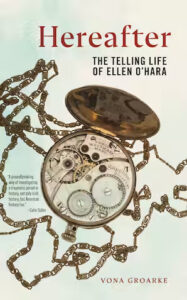My great-grandmother stops by today to check in on me.
She makes tea from leaves and bids me drain it quickly,
for once in my life, not to speak. Looking into the cup,
she tells me to buy a bicycle, grow my hair and wear it up,
that a man I don’t know thinks ardently of me, that number six
will be significant, and that I should have my eyes checked.
It seems she gets by by fortune-telling on the other side:
no version of the future, she says, is wasted on the dead.
It’s true my eyes have been feeling the strain of hour on hour
screen-gleaning for verifiable facts. I started with no more
than her name; now I have a list of questions to put to her
that she doesn’t seem, to be frank, inclined to answer.
She tilts the leaves, examining, but gives no more commands,
then gones herself into thin air. The small, white cup remains.
What am I to do with her now, how should I have her dress?
Fur-collared greatcoat; green-ribboned hat; stout, invincible shoes?
I need her to look great-grandmotherly, if I’m to believe in her
but having known only one grandparent, scantly (her daughter),
I’m not sure how to begin. With a headstone handbag at her feet
with her whole life inside? She doesn’t so much as glance at it.
The look I give her giving me dares me give her paste earrings,
a tortoiseshell clip in her hair. I give her, instead, a herring
-bone tweed skirt, little spectacles, the necessary gold band,
a walking stick (Where did this come from?) in her hand,
and a brooch of a harp pinned to her coat, lest anyone
not know by looking at her face where she comes from.
I dress her in a life that seems to me plausible, if not true.
“You have beautiful hands,” I say. She doesn’t answer me.
__________________________________

Excerpted from Hereafter: The Telling Life of Ellen O’Hara by Vona Groarke. Copyright © 2022. Available from NYU Press.
Vona Groarke
Vona Groarke has published twelve books, including eight poetry collections, most recently Link: Poet and World. Her Selected Poems was winner of the 2017 Pigott Prize for Best Irish Poetry Collection. A Cullman Fellow at the New York Public Library (2018-19), she has taught creative writing at the University of Manchester in the U.K. since 2007 and is currently Writer in Residence at St John’s College, University of Cambridge. Essayist, editor, reviewer, and critic, she makes her home in rural Sligo in the west of Ireland, where she reads and writes













